 "I'm so tired...I just can't get a good night's sleep!"
"I'm so tired...I just can't get a good night's sleep!"
"All I want is to wake up energized and to feel like I can take on whatever comes my way!"
Does this sound like you or someone you know?
Getting a good night's sleep is not just a luxury, but a requirement for good health. Research shows that not getting enough sleep, or getting poor-quality sleep, increases the risk of high blood pressure, heart disease, obesity, and diabetes.
A six-cylinder engine
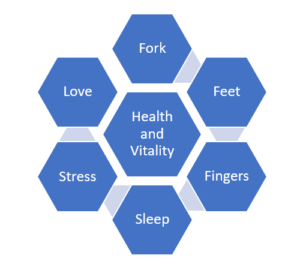 One of our favorite people in the lifestyle medicine world is Dr. David Katz. Dr. Katz often talks about the "six cylinders in the engine of lifestyle as medicine," which include:
One of our favorite people in the lifestyle medicine world is Dr. David Katz. Dr. Katz often talks about the "six cylinders in the engine of lifestyle as medicine," which include:
- Feet (exercise)
- Fork (eating well)
- Fingers (not smoking)
- Sleep (quality and quantity)
- Stress (managing and preventing)
- Love (social connections)
We obviously focus a lot of our attention on the fork (and eating deliciously and nutritiously) and an argument can be made that this is the most important cylinder in the engine. The reality is that all six cylinders have to work in tandem. If one part of the engine gets blocked, the whole thing can seize up and stop working. This is why so many people in the Blue Zones thrive for so many years (many into their 100s).
Think about it.
If you are stressed, you may not sleep well. If you are exhausted, you are more likely to make poor food choices. If you feel like you have no energy, you are probably not going to get enough exercise.
The good news is success in one area can translate into improvements and success in the other cylinders. Exercising will help you manage your stress, which will help you get a good night's rest, and all of these things will help you make better food choices, which will help your engine fire on all cylinders.
Nation of insomniacs!
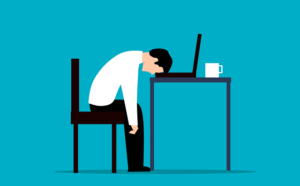 Let's face it, as a society, we do a terrible job of getting enough quality sleep. But good sleep is absolutely critical for good health. Good sleep enhances the functioning of our bodies and brains to help us focus, think and learn, as well as stay healthy mentally and physically. If we don't get enough sleep (either quantity or quality), our immune systems are impaired, increasing the risk of high blood pressure, heart attacks and stroke, and also increasing the risk of anxiety, depression, Alzheimer's and other dementia-related issues.
Let's face it, as a society, we do a terrible job of getting enough quality sleep. But good sleep is absolutely critical for good health. Good sleep enhances the functioning of our bodies and brains to help us focus, think and learn, as well as stay healthy mentally and physically. If we don't get enough sleep (either quantity or quality), our immune systems are impaired, increasing the risk of high blood pressure, heart attacks and stroke, and also increasing the risk of anxiety, depression, Alzheimer's and other dementia-related issues.
How does food affect our sleep?
Have you ever noticed a desire to eat more when you are sleep deprived? There's a reason. Getting less sleep reduces a hormone in your body that signals that you are full. At the same time, it increases the "hunger hormone" - ghrelin - that tells your brain you're hungry and to seek out food.
Studies have been done to see how people make food choices after a full night's sleep vs. after being sleep deprived for just one night. In one of these studies, participants ate over 600 calories more when sleep deprived vs. when properly rested. If you are consistently not getting enough sleep, these extra calories (plus the extra sodium, sugar and fat) really add up!
There are many nutrients in our foods that work together to promote good sleep. These include magnesium, calcium, potassium, antioxidants, B vitamins and Vitamin D. You may recognize that each of these are found abundantly in REAL foods, and less so in processed food, so rule number one is EAT REAL FOOD!
Additionally, there are three very important substances that affect sleep:
Tryptophan:
a natural sedative that must be obtained from our diets. It is a component of plant and animal proteins and is an ingredient required to make serotonin. You may hear someone say that tryptophan is the reason you feel sleepy after eating your Thanksgiving turkey. Yes, turkey does contain tryptophan; however, it is likely the size and heaviness of the entire Thanksgiving meal that causes you to curl up for a little shut-eye.
Serotonin:
the precursor to melatonin. It is used to transmit messages between nerve cells and helps you feel calm and sleepy. It also helps regulate our sleep/wake cycle and plays a key role in maintaining mood balance. Low serotonin levels have been linked to difficulty sleeping and depression.
Melatonin:
a hormone that helps regulate our sleep/wake cycle and control our internal clock, and there are certain foods that can actually increase blood levels of this hormone.
The following is a list of several foods that will help boost tryptophan, serotonin and melatonin, helping the quantity AND quality of sleep!
 Tart Cherries: tart cherry juice and whole tart cherries have been shown to aid in sleep, since they boost melatonin. This time of year is a great time to enjoy the Nectarine & Cherry Farro Salad!
Tart Cherries: tart cherry juice and whole tart cherries have been shown to aid in sleep, since they boost melatonin. This time of year is a great time to enjoy the Nectarine & Cherry Farro Salad!- Kiwi: loaded with vitamins C and E, and folate, this is a fabulous pre-bedtime snack that promotes seratonin. Studies show eating two kiwi before bed can increase your sleep duration by one hour over the course of a month. Enjoy kiwi by themselves or try the Green Fruit Salad or Mixed Fruit Salad.
- More Fruit: bananas, pineapple and oranges are excellent sources of vitamin B6, which is key to our body's ability to make melatonin.
- Walnuts (and other nuts): are also a natural melatonin booster. Try the Dreamy Fruit 'n Nutty Salad...it's a great combo of yogurt, nuts AND fruit!
 Soybeans: tempeh, edamame and tofu are great ways to get soy into your routine. These soy foods are rich in isoflavones, which increase the production of serotonin. Have you tried our Banana Nut Butter Pudding (there is tofu hidden in this great-tasting pudding!) or the Tempeh Sloppy Joes or Roasted Garlic Parmesan Edamame?
Soybeans: tempeh, edamame and tofu are great ways to get soy into your routine. These soy foods are rich in isoflavones, which increase the production of serotonin. Have you tried our Banana Nut Butter Pudding (there is tofu hidden in this great-tasting pudding!) or the Tempeh Sloppy Joes or Roasted Garlic Parmesan Edamame?- Fish: most fish, and especially salmon, halibut and tuna, will provide vitamin B6, which is needed to make melatonin.
- Dairy: milk (warm milk, just like grandma used to say), and yogurt are good choices when it comes to pre-bedtime snacks. Notice we didn't say sugar-loaded ice cream! Instead, try smoothies with fruit and yogurt! Dairy contains tryptophan, the sleep-promoting amino acid...in combination with the fruit, a winning combination!
 Whole grains: choose a little serving of whole grains for your snack one hour before bedtime -- some great ideas are air-popped popcorn (we have several delicious ideas!), oats (Baked Oatmeal Cups or Chunky Monkey Breakfast Cookies), or simply a couple of whole wheat or whole grain crackers with nut butter.
Whole grains: choose a little serving of whole grains for your snack one hour before bedtime -- some great ideas are air-popped popcorn (we have several delicious ideas!), oats (Baked Oatmeal Cups or Chunky Monkey Breakfast Cookies), or simply a couple of whole wheat or whole grain crackers with nut butter.- Kale: we all know yogurt and milk are good calcium-rich foods, but don't leave out green leafy vegetables like kale and collard greens! They are loaded with healthy amounts of calcium, and research suggests that being calcium deficient actually can make it more difficult to fall asleep. Try our kale chips - 3 ways!
- Stress-busting Tea: enjoying a hot cup of chamomile or passionflower tea can help increase glycine, a chemical that relaxes nerves and muscles, and acts as a mild sedative.
Try these other tips to help you wake up rested and ready to take on your day!
Avoid large meals before bed. A light snack with sleep-inducing foods is ok, but a big meal will cause a restless night's sleep. It's best to give your body energy when it needs it most (in the morning and throughout the day vs. when it is winding down to go into sleep mode).
Do you have a cut-off time? A great habit is to have a caffeine cut-off time several hours before bed. Caffeine activates your central nervous system and makes it difficult to fall and stay asleep. The effects typically peak about 30 minutes after consumption; however, up to 25% of the effects can still be swirling around in your body after 10-12 hours. See our coaching tip for more about the importance of a caffeine cut-off time!
Avoid or limit alcohol. You may think alcohol would relax you and help you sleep better, but it actually causes less restful sleep, in part, due to the way it raises your body temperature.
Avoid high-sugar and heavily processed foods. These foods reduce serotonin levels and impair your sleep. Plus, they can cause you to wake up feeling hungry and craving even more heavily processed and unhealthy foods. It's a vicious cycle!
Get regular exercise. Yes -- you will sleep like a baby!
Enjoy a consistent bedtime routine. So your body really does know when it's time to sleep.
Clear your mind. Have a pad of paper by your bed to quickly write down anything that's on your mind. Once it's on paper, you can more easily relax and trust that it will be there for you tomorrow.
There really is a cycle at play here.
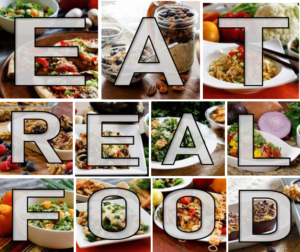 We have heard from many Eat REAL America members and Eat REAL Cookbook owners who said how surprised they were that they feel like they are sleeping better and have more energy throughout the day. As you can see (probably no surprise), REAL food is the key!
We have heard from many Eat REAL America members and Eat REAL Cookbook owners who said how surprised they were that they feel like they are sleeping better and have more energy throughout the day. As you can see (probably no surprise), REAL food is the key!
If you or someone you know struggle with sleep, be mindful about what you eat before bedtime - and throughout the day - and see if it helps!
Then, please share your stories and successes with us!

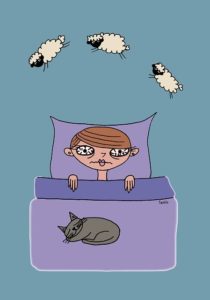
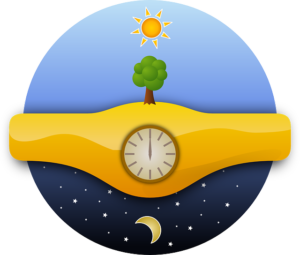
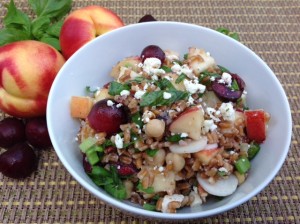
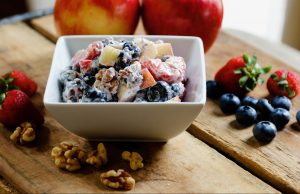
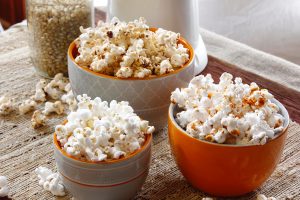 Whole grains: choose a little serving of whole grains for your snack one hour before bedtime -- some great ideas are
Whole grains: choose a little serving of whole grains for your snack one hour before bedtime -- some great ideas are
Leave A Comment